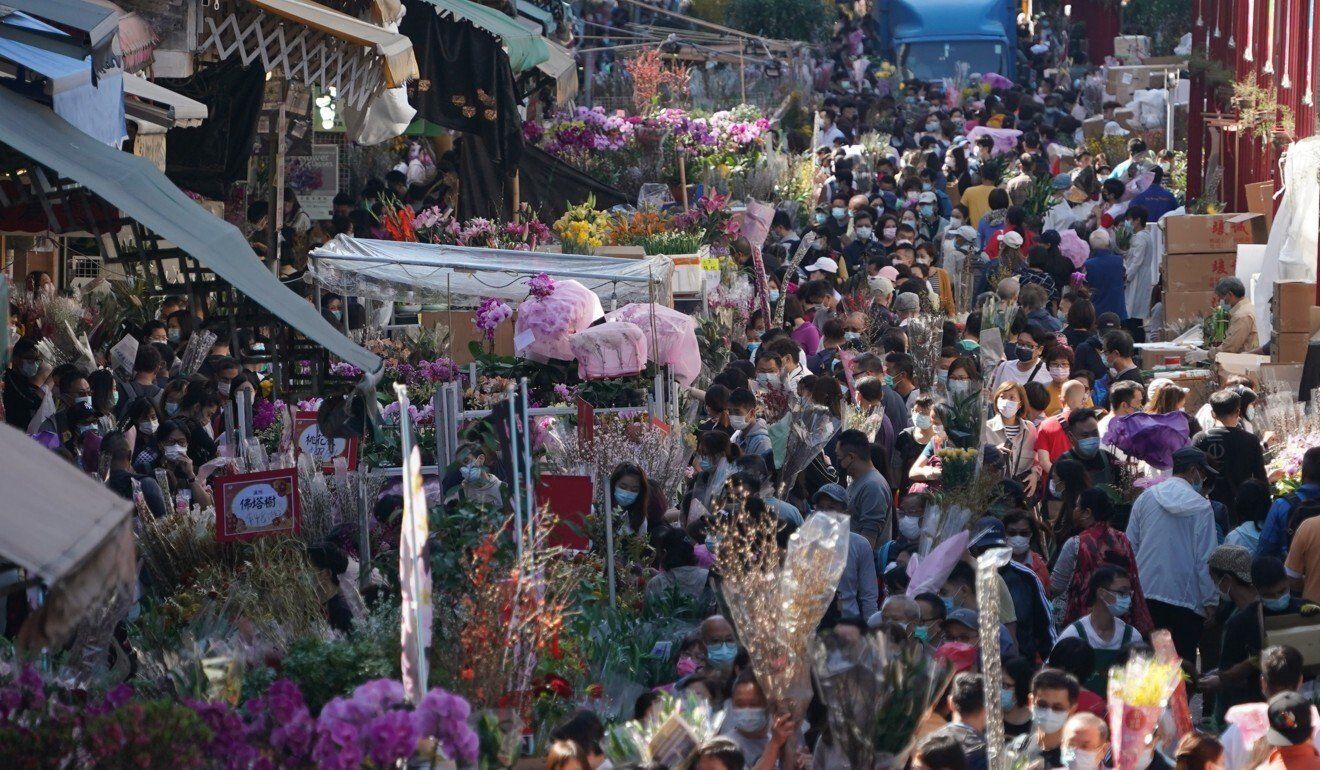If people do not continue to practise social distancing, city could end up back at ‘square one’ after the festivities, government adviser cautions. Authorities confirm 26 new cases, order new lockdown and evacuation of rehabilitation centre.
Hong Kong’s leader has said the government will suspend its controversial “ambush-style” lockdown operations over the Lunar New Year holiday, even as a government adviser urged the public to remain vigilant or risk going “back to square one” after the festivities.
Speaking ahead of her Executive Council meeting, Chief Executive Carrie Lam Cheng Yuet-ngor said on Tuesday the “very staff intensive” operations involving more than 10,000 workers would temporarily stop as the pandemic had started to ease, with the number of new infections – including untraceable ones – decreasing.
The city confirmed 26 new infections, which is roughly in line with the average recorded over the past week, although the number was the lowest since Saturday when 19 cases were reported.
Health authorities have carried out 26 lockdowns, with the latest one beginning at 7pm on Tuesday at Kiu Yu Mansion and Kiu Fat Mansion on Lok Shan Road in To Kwa Wan.
Chief Secretary Matthew Cheung Kin-chung earlier said the government would intensify the “compulsory testing operations” in specified restricted areas until Wednesday, the day before Lunar New Year’s Eve.
Lam stressed the lockdowns had been “done as expeditiously as possible to reduce the disruption on the residents concerned”.
“It has proven to be effective … but having regard for the importance Hong Kong people attach to Chinese New Year, I think earlier on, the chief secretary for administration had mentioned that we would conduct this operation until [Wednesday],” she said.
But the chief executive also expressed hope residents would be restrained in their celebrations.
“I hope people will continue to avoid going out or taking part in family gatherings,” she said. “They should remain vigilant about personal hygiene, and I hope that after the Chinese New Year holiday, we can gradually return to our normal lives.”
The government would discuss with schools the possibility of gradually resuming in-person classes after the holiday and also consider allowing the reopening of some businesses that had been closed for extended periods under social-distancing regulations, she said.
 Hongkongers crowd the flower market in Prince Edward on Sunday ahead of Lunar New Year.
Hongkongers crowd the flower market in Prince Edward on Sunday ahead of Lunar New Year.
Professor David Hui Shu-cheong, a respiratory medicine expert at Chinese University and a government adviser on the health crisis, agreed people needed a break from the lockdowns over the holidays, but warned they should not let their guard down.
“As long as there’s no large-scale family gathering during the holiday, compulsory testing will suffice,” Hui said. “If the number of confirmed cases does go up tremendously after Lunar New Year, then we are back to square one. So it all depends on the general public.”
Of the latest cases, 21 were locally transmitted, including five that were untraceable. The remaining five infections were imported. The city’s tally of confirmed cases stands at 10,693.
Two more patients succumbed to the disease – an 82-year-old woman with underlying health conditions who died on Monday evening and an 87-year-old man with chronic disease who died on Tuesday night – taking the number of related fatalities to 188. About 20 people also tested preliminary-positive for the virus.
More than 40 residents and over 30 staff at the Po Leung Kuk On Tai Rehabilitation Centre in Kwun Tong were sent into quarantine on Monday evening over fears of a possible outbreak at the facility. A resident was among the latest confirmed infected, while two employees also tested preliminary-positive, one of whom previously visited an infected family member while asymptomatic during the incubation period of the disease.
Lam was also asked whether the government had lowered its standards for the Sinovac vaccine doses coming from mainland China. Health authorities earlier decided they did not require the company to publish phase-three clinical data in a medical journal and only needed the information it had submitted to the World Health Organization.
Lam insisted her administration was following the city’s regulations, which allowed for approval of a vaccine without the final round of clinical data.
“The law says there are three criteria for experts to consider: the three phases of clinical data, the information of its usage in another place and the so-called journal publication,” she said. “But the law also says that if we have justifications, we don’t need to require all three criteria to be fulfilled … We completely followed these rules, and there was no bias in this.”
Lam urged residents to view the coming free vaccination programme “scientifically and objectively”.
Hong Kong is expecting its first batch of 1 million doses of the Pfizer-BioNTech vaccine by late February, and the government has also purchased the vaccine jointly developed by British-Swedish pharmaceutical firm AstraZeneca and the University of Oxford.
But the pro-establishment camp has also asked Beijing to supply a vaccine created by the mainland’s Sinopharm, of which Macau received its first 100,000 doses on Saturday.
Lam first revealed she had asked for the central government’s help in procuring a fourth vaccine last month. The vaccination programme in the casino hub, which has enjoyed more than eight months without any local infections, began on Tuesday, with top officials including Macau Chief Executive Ho Iat-seng receiving the first jabs.
Following the vaccinations, Ho said: “None of us feel unwell, and we will get the second shot on time … I hope the availability of the vaccine will help protect the lives and health of our citizens.”
Frontline medical workers, care home employees, aviation workers and people in other high-risk occupations will be given priority, while other residents are in line to get the free shots as soon as February 22. Ho said residents could choose whether to be immunised and which type of vaccine they wanted.















